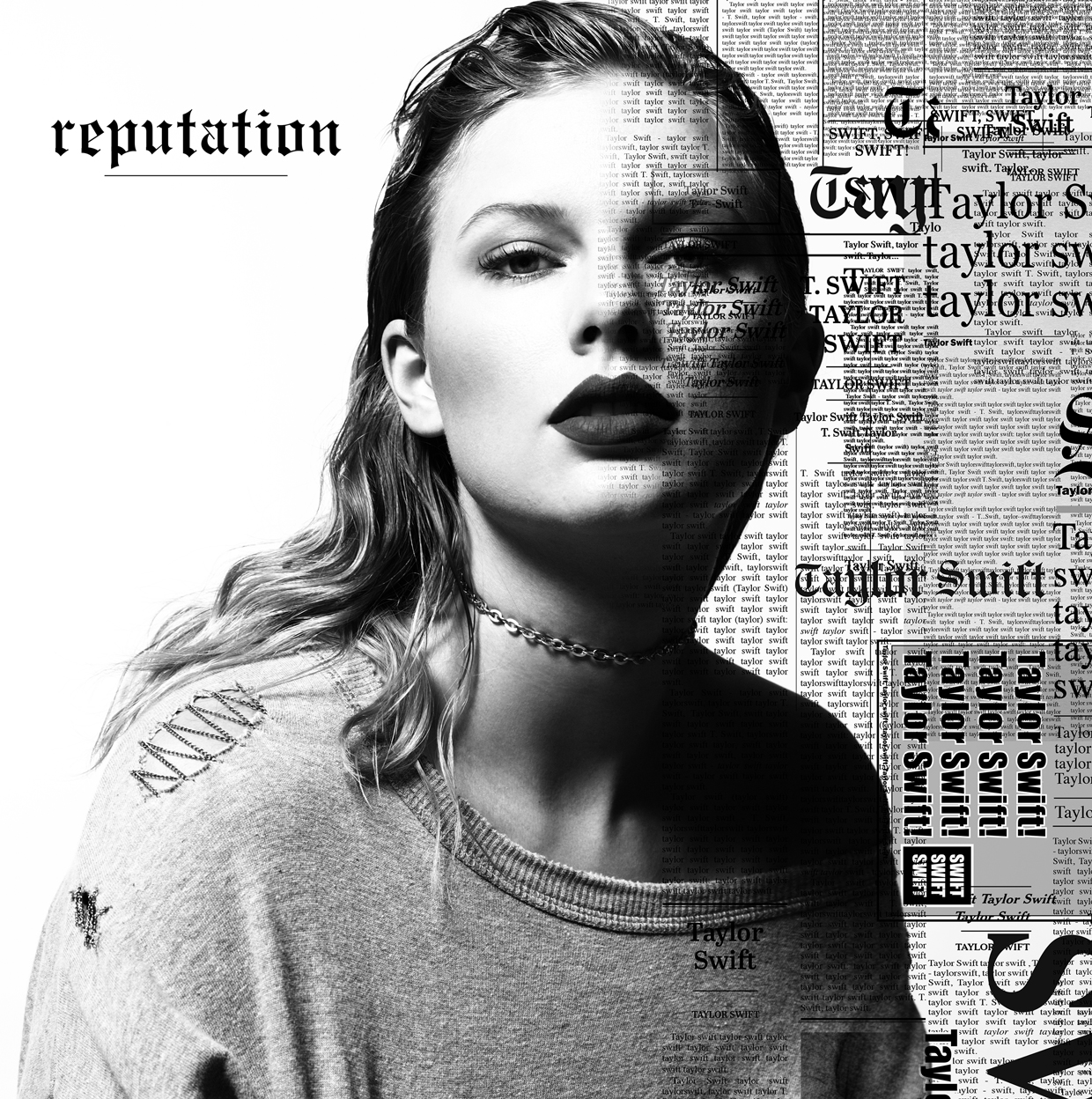The opening page of Taylor Swift’s Reputation magazine—the print companion to her new album Reputation, available for purchase exclusively at Target—is about gossip, both as an industry and as a concept. “We may hear rumors about a person and believe those things to be true,” Swift writes in an essay. “We may one day meet that person and feel foolish for believing baseless gossip.” Later in the piece, she addresses the press specifically, saying, “When this album comes out, gossip blogs will scour the lyrics for the men they can attribute to each song.” It’s true that, as Swift outlines, her adult life has been defined by its proximity to gossip—from more innocent speculation about her famous boyfriends, to Kim Kardashian’s airing of her private conversations with Kanye West. And so even though her career has flourished because she willingly feeds the gossip machine, it’s also no surprise that she essentially created an entire publication in order to once again position it as her ultimate foil. Here, though, she goes a step further, alleging that not only is gossip an existential threat to the life of Taylor Swift, but also to that of an entire slice of humanity. “This is the first generation that will be able to look back on their life story documented in pictures on the internet,” she states. “And together we will all discover the after-effects of that.”
If you read the essay in full, its logic starts to break apart. Towards the end, she reasons that one negative of being in the public eye is that her “heartbreaks have been used as entertainment,” an argument that not only elides the very foundation of her music, wealth and fame, but also more or less that of, well, entertainment in general. Still, the particulars of what Swift is saying in her vanity magazine are less important than what the publication itself intends to accomplish, which is to create a closed loop between Swift and her legion of superfans, in the process cutting out gossip hounds, reporters, and anyone else with suspicious, prying eyes. This operation has not been limited to just the Reputation magazine, and instead has been the entire point of the album cycle itself. Swift has not appeared on any magazine covers other than her own, and has not spoken to any journalists in advance of the album. Instead she has controlled the release of content as tightly as a microdose, with a measured stream of expensive music videos, behind the scenes and in-studio clips, private listening sessions, and encouragement to her fans via Tumblr. The first time she reentered our shared world was this past weekend, where she performed on Saturday Night Live, a show from which she was otherwise conspicuously absent.
https://www.youtube.com/watch?v=3s1rvMFUweQ
With all of this as a prelude, you would expect to press play on Reputation and hear songs about the struggle of life in the fishbowl—how it builds up and tears relationships down, leaving Swift lost and alone, dreaming of future relationships and mourning past ones. So it’s funny, unexpected, and invigorating that the album itself actually does the opposite—throughout Reputation, Swift constantly refers back to the grand implications of its title, but never has she sounded freer than she does here, a self-styled villain biting the forbidden fruit of gossip and letting its juices run down her neck.

Also Read
Choppered and Tuned
This is obvious early on second track and future single “End Game,” the song featuring Future and Ed Sheeran that works so much better than it should on paper. “Big reputation, big reputation / Ooh, you and me would be a big conversation, ahhh,” she exhales on the refrain, sounding refreshed by the possibility, as if she’s back in a Diet Coke commercial again. When she sings, “And you heard about me / Ooh, I got some big enemies,” she isn’t running from her public feuds but embracing them, savoring them and mocking them all in a single line. The next song “I Did Something Bad” drops the facade altogether, as she sings in the first verse: “I never trust a narcissist, but they love me / So I play ‘em like a violin, and make it look oh so easy / ‘Cause for every lie I tell them, they tell me three / This is how the world works, now all he thinks about is me.” The song is ostensibly about a man, but it also tracks perfectly along the lines of any major celebrity’s relationship with the gossip press, yet instead of positioning herself as the helpless victim, Swift flips the switch all the way and reveals herself to be the string-puller, and not a reluctant one. “They say I did something bad, but why’s it feel so good?” she sings calmly during the chorus. “And I’d do it over and over and over again if I could, it just felt so… good.”
Even when the songs get more narrowly focused on the tumult of Swift’s unstated relationships, it’s impossible to miss the excitement she seems to take in being the bad one. “I’ve been breaking hearts a long time, and toying with them older guys / Just playthings for me to use,” she sings on “Don’t Blame Me,” a towering anthem that comes as close to being soulful as anything she’s ever recorded. That’s followed by “Delicate,” a song that Swift said during a livestreamed release party is the first time vulnerability is entered into the album. Still, in narrating scampering out of bed to meet a boy in the back of a bar, she sounds unshackled: “My reputation’s never been worse,” she sings, returning to that word. “So you must like me for me.” She continues: “We can’t make / Any promises now can we, babe? / But you can make me a drink.” In the chorus she asks, “Is it cool that I said all that? / Is it chill that you’re in my head?”—questions that intimate a dropping of the guard with this new boy, a connection forged instantly.
The rest of the album mostly ping-pongs back and forth between stories of lust and regret, rendered in terms that have formed the vernacular of her discography: “My castle crumbled overnight, I brought a knife to a gunfight / They took the crown, but it’s alright,” she sings on “Call It What You Want,” conjuring familiar images of fairy tales and fables. Still, this sort of Swiftian red meat is paired with an embrace of the sounds of pop music, at a level that her previous albums, even 1989, never reached. This gives even the sort of songs that one imagines she could write in her sleep a new kind of energy, even if the production here—handled either by Max Martin and Shellback or Jack Antonoff—presents a recently fossilized idea of what contemporary pop music actually is. The recurrence of bass that is almost clinically injected into many of these songs suggests that Swift has an ongoing fixation with not just Yeezy but Yeezus (2013), though Reputation shares its DNA with albums from even earlier, such as the stuttering dubstep-era dance-pop of Justin Bieber’s 2012 album Believe.
Swift’s albums have never really been about the arrangements, even on her opus Red, which is her most stylistically diverse and rewarding album. On Reputation, as on her more country-indebted albums, the production is generally there to merely frame her songwriting, which remains as singularly strong as ever, despite what “Look What You Made Me Do” would have had us believe. Sometimes, the primitivity of the production here holds a song back, such as on “Gorgeous,” which sounds like a wind-up toy playing the sound of an old Windows computer booting up. There is also the intermittent problem of Martin, Shellback, and Antonoff trying to approximate rap beats. But Reputation contains in places an ethereal lusciousness that is mostly foreign to her catalog, like on the pillowy “Delicate,” the long twinkle of “Dress” (her homage, it sounds like, to Bruno Mars’ “Versace on the Floor”), or the rainy day pitter-patter of “Call It What You Want.” These songs hint at a more luxurious version of Swift’s music, suggesting new paths for her to travel.
One question raised by Reputation is whether Swift relishing the role of wolf in sheep’s clothing in the cutthroat world of public and private gossip will backfire. Is this who she is and really wants to be, or is this just a pose assumed out of necessity? To that end, the album ends on its most placid, calming note, with the warm, acoustic ballad “New Year’s Day,” which is left rough and raw, as if we’re hearing a demo. Over a piano played by Antonoff that has the soft glow of early sunrise, Swift paints a memorable image of enduring companionship: “I want your midnights / But I’ll be cleaning up bottles with you on New Year’s Day.” Later in the song, she sings a looped refrain, reciting a line she said she has been keeping in her pocket a while: “Hold on to the memories,” Swift sings. “They will hold onto you.” She does not sound overwhelmed.




